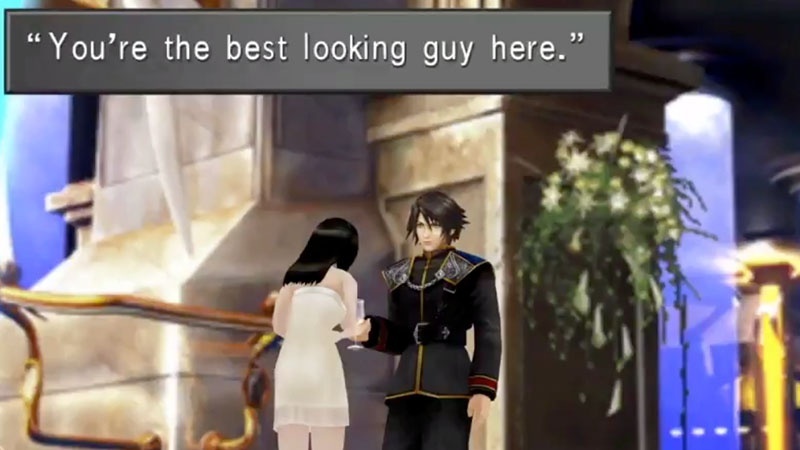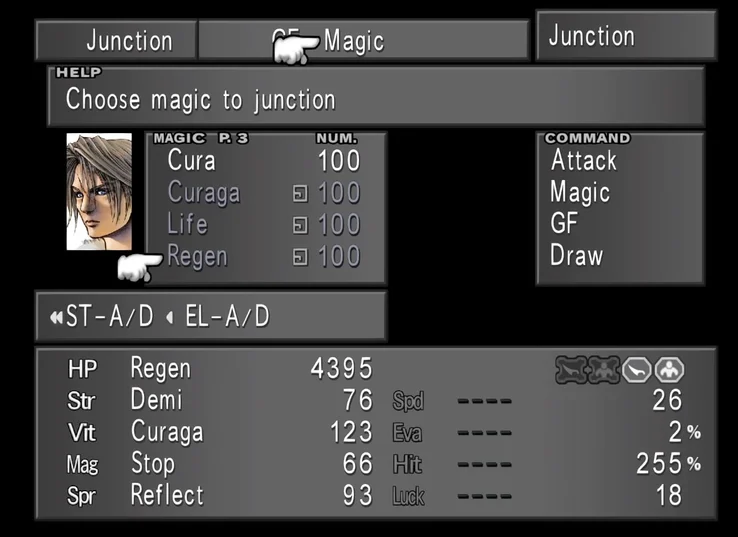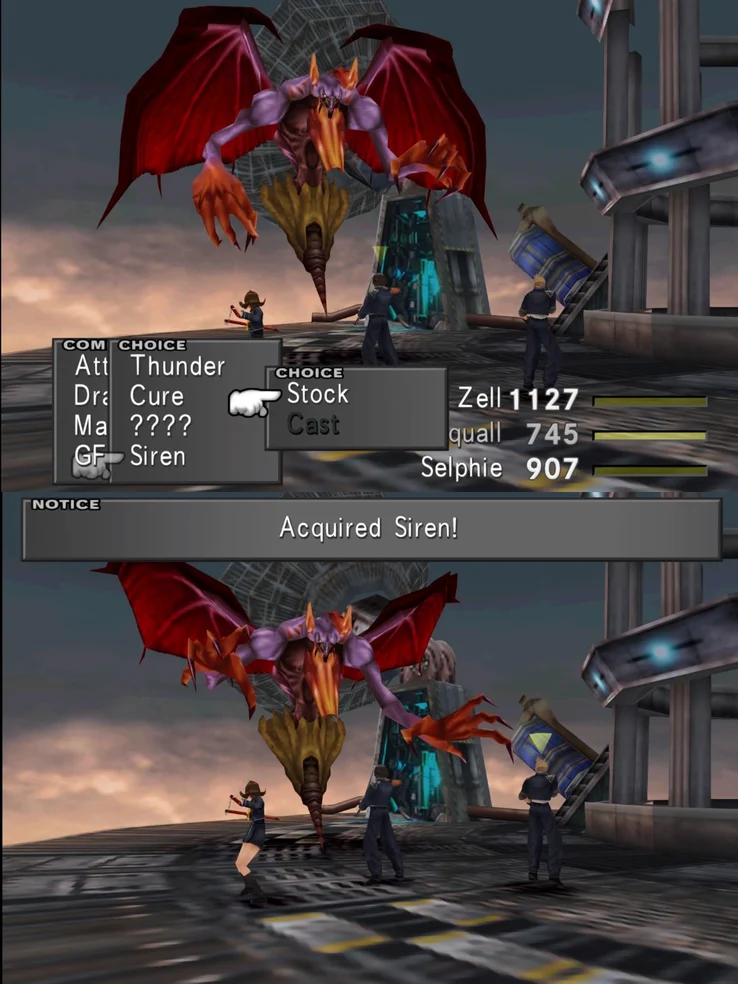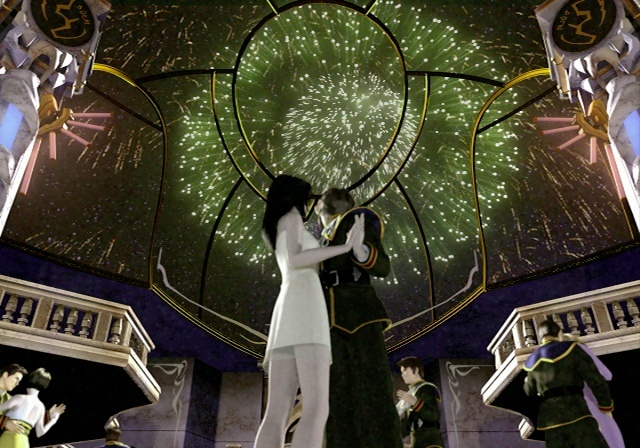Final Fantasy VIII Remastered (PlayStation 4) Review
By Leo Epema  27.10.2019
27.10.2019

Final Fantasy VIII is late to the game in getting remastered. Some people claim this is because the game's source code was misplaced. Others believe the developers saw Final Fantasy VIII as a black sheep because it is rather different from many previous entries, to the chagrin of some gamers. In any case, the game's main non-cutscene graphics have been outdated for a while, and the developers intended to improve upon them. How did they fare, and does the game still hold up after twenty years?
Final Fantasy VIII, like many instalments in this franchise, is fairly heavily focused on grinding - grinding in the sense of drawing magic spells from enemies in battle. In previous instalments, magic spells were either learned or purchased and had limited uses based on how much MP (magic points) magic users had. In this game, magic spells are consumables: up to 100 of each spell can be equipped, and each use depletes the total amount. Spells must first be taken from enemies by the character that wants to equip them. That can be a time-consuming process, considering each draw of magic yields random amounts of the spell and each draw takes up an entire character's turn in the turn-based combat system.
Some players might find it annoying that magic is consumable, because it can get in the way of the junction system. The junction system allows players to equip magic to a character's stats (such as strength, vitality, and magic) to power up that character. The higher the quantity of that spell that's equipped, the higher the stat is raised. However, each time a spell is used, it detracts from the amount of the spell that's equipped to the stat. This means that you pay a hefty price for the use of magic, namely the weakening of characters. This seems like an odd choice considering magic isn't very powerful at first anyway. Chances are you will simply be slashing your way out of every encounter.
This belies the depth of the game. In reality, magic can be very useful to deal decent damage to enemies that are weak to certain elemental damage, and unlike in other Final Fantasy games, magic doesn't take time to charge: it can be used as quickly as melee attacks. There is also useful magic such as Break, which erodes an enemy's defenses, causing melee attacks to do increased damage. There is also the Ultima spell, which inflicts massive damage, certainly if used in conjunction with Double or Triple, which double or triple the times the spell is used.
Thankfully, magic doesn't have to be drawn exclusively from enemies, which is tedious. No, characters can also slurp it up by drawing from 'draw points', which are magic geysers dotted across the game map and which can also be found in towns and other places. Unfortunately, there aren't too many of them, and the best magic is mostly found on a specific island that's home to enemies that have reached their highest level. Even if the entire island's magic has been soaked up, it's likely that only one of the protagonists now possesses a decent amount of magic… and even then, that character will require much more of it. Draw points feel like an afterthought - almost as though the developers realized that magic was a little hard to come by, so they just threw in some magic wells.

There are more ways of acquiring spells: they can also be refined from items received as rewards for battles. But again, that requires a bit of grinding, which becomes monotonous rather fast since battles have no element of randomness. Whereas the upcoming remake of Final Fantasy VII looks as though it will allow for some strategizing when it comes to character movement and timing of attacks, FFVIII offers no novelty. But then, no classic Final Fantasy game does.
Considering refining magic from loot takes a long time, one might want to refine magic from playing cards. That's right; this game has a card game built in called Triple Triad - a very enjoyable card game at that! NPCs can be played against, and if they are defeated, one or more monster cards can be taken from them. Those cards can be collected for a quest and trophy, but they can also be refined into a magic spell or item associated with that monster. In other words, if the player is sick of grinding battles, they can also just… grind card games. Yay. That said, it's also possible to gain the ability to turn monsters into cards, which also automatically kills them. That still does require the monster to be weakened, though. Overall, it all comes down to grinding for magic… FFVIII really loves that.
So, how does the remaster handle the arguable flaw of magic grinding? Well, the remaster renders drawing magic much less time-consuming because it includes a function to speed up the game threefold. That means fully stocking up on one magic spell for one character might only take one battle. That is a huge plus. The remaster also has a function to turn characters invincible, max out their speed so that they instantly gain a turn, and make them able to use their limit breaks (powerful last-resort attacks) every turn. Taking down enemies for grinding is much more doable because of it. Despite all of that, grinding for magic remains a chore - it's baffling why the developers thought drawing magic from enemies each turn would be a fun gameplay mechanic. It would've been nice if magic drawing had been a mini-game of sorts that would yield more spells the better you play.
In summary: magic can be drawn from enemies in battle, from magic draw points, and can be refined from loot or from cards. Nonetheless, it remains grindy and good magic is a bit hard to come by. More magic draw points would've alleviated the issue.

While the junction system isn't perfect because magic requires a long time to grind, it does allow for nice character customization. If good use is made of the junction system, battles become a cinch. Your characters will be fast, powerful and can even have magic equipped to their 'elemental attack' or 'elemental defense' to turn their attacks into 50% fire attacks or even fully elemental. That can be great for enemies who are resistant to physical damage. If magic is equipped to elemental defense, damage from magic can be halved or even absorbed. The junction system is great in that sense, but enemies become pushovers if the junction system is exploited well. That surely can't have been the intention - games should retain some challenge.
The fact that it's necessary to get at least a decent number of spells in order to optimize the characters, can be considered tedious because it pushes gamers into a corner. It feels like the game punishes the player for not being insanely excited about the prospect of grinding across the map. The game is nuts for making magic a consumable item, since it gets in the way of optimizing your battle party and requires incessant drawing. On a more positive note, some summonable monsters called GFs can provide the characters with stat boosts such as 'strength + 40%, but those are rare. In short, the junction system is great in a way, because equipping magic to stats allows for character optimization to make battles easier. On the other hand, the fact that spells are consumed makes drawing magic more of a necessity, and gaining magic takes long enough as it is. It's all very grinding-oriented.
The game's biggest weakness is probably the summons, AKA 'GFs'. Their attacks come with protracted unskippable in-battle cutscenes. Once decent magic has been obtained or characters' melee attack stat has been raised high, their attacks become ineffective by comparison. The only GFs that remain useful are status effect-inflicting ones.

Final Fantasy VIII contains a love story, and it's expertly told. Squall's love interest, Rinoa, is the perfect foil because she gives him a reason to fight for somebody for unselfish reasons, and she brings out Squall's nature as a protective leader. Squall is afraid of losing the people he loves, and so he tries to never love again. Because of a past event, he tries never to rely on others, and he hates making others rely on him.
Rinoa and the others show him the value of friendship and the here and now, because nobody can predict what losses will be suffered in the future. In essence, Final Fantasy VIII is a story about growing up, accepting loss, and about the meaning of courage. These themes are explored well, and sub-themes are embodied by each character.
One of the main themes is that friendship and love conquer all. It's one of the most internally consistent and rousing storylines of the series. Some characters like Irvine are woefully underdeveloped, but that's nothing new. The characters relate to each other well. Squall and Rinoa's relationship develops fairly naturally. The main antagonist, Ultimecia, unfortunately is as flat as a pancake.
And so, we arrive at the presentation. The remaster really dropped the ball on this. Cutscenes have big issues with artifacts and slight blurriness. Even the in-game backgrounds have lost definition, which can interfere with the excellent atmosphere of locales. Coupled with the artifacting, it has made certain spectacular scenes from the original game look mediocre.
Adding to the disappointment is that, during gameplay, Squall now looks more like his Dissidia incarnation or some anime-like version of himself. His hair has been remodelled to look like it is being held up magically, and it doesn't have the same strands as his cutscene model does. His face shape and facial features are also a bit off. Other characters don't exhibit that problem: Quistis and Selphie look much more like their cutscene incarnations than before, and Seifer is particularly accurate. Overall, the character designs are sharp, smooth and detailed.
There isn't much to say about the soundtrack: it remains varied and dynamic, with sweet songs, bombastic, glory-inspiring battle themes, a creepy chant and even a wacky futuristic track. All the tracks are high-quality. The remaster does have a strange issue where one of the tracks, 'The Landing', is substituted once for a shallow MIDI version.

Cubed3 Rating
Very Good - Bronze Award

Final Fantasy VIII is the favourite instalment of yours truly. Its story is consistent and powerfully emotional, the characters relate well and the way they meet up makes sense. The presentation, despite having been marred by the remaster, is still impressive and the masterful soundtrack thankfully wasn't touched. The new character models are impressive, though Squall seems out of place with his more anime-like hairstyle and smoothed out features. There is also an issue with framedrops in the menus, which makes boosting summons difficult. The 'triple speed' function is a welcome feature that mitigates the tediously slow grinding, and the function to make characters invincible and have maximum speed is a great addition for beginners or those who want to get through certain battles quickly. Overall, it's not a bad remaster, it's mediocre. The game itself, however, is great. Pick it up.

![]() 7/10
7/10
![]() 7/10
(1 Votes)
7/10
(1 Votes)
 Out now
Out now  Out now
Out now  Out now
Out now  Out now
Out now Comments
Comments are currently disabled

 Sign In
Sign In Game Details
Game Details Subscribe to this topic
Subscribe to this topic Features
Features





 Top
Top

